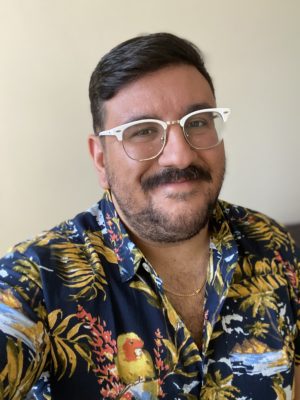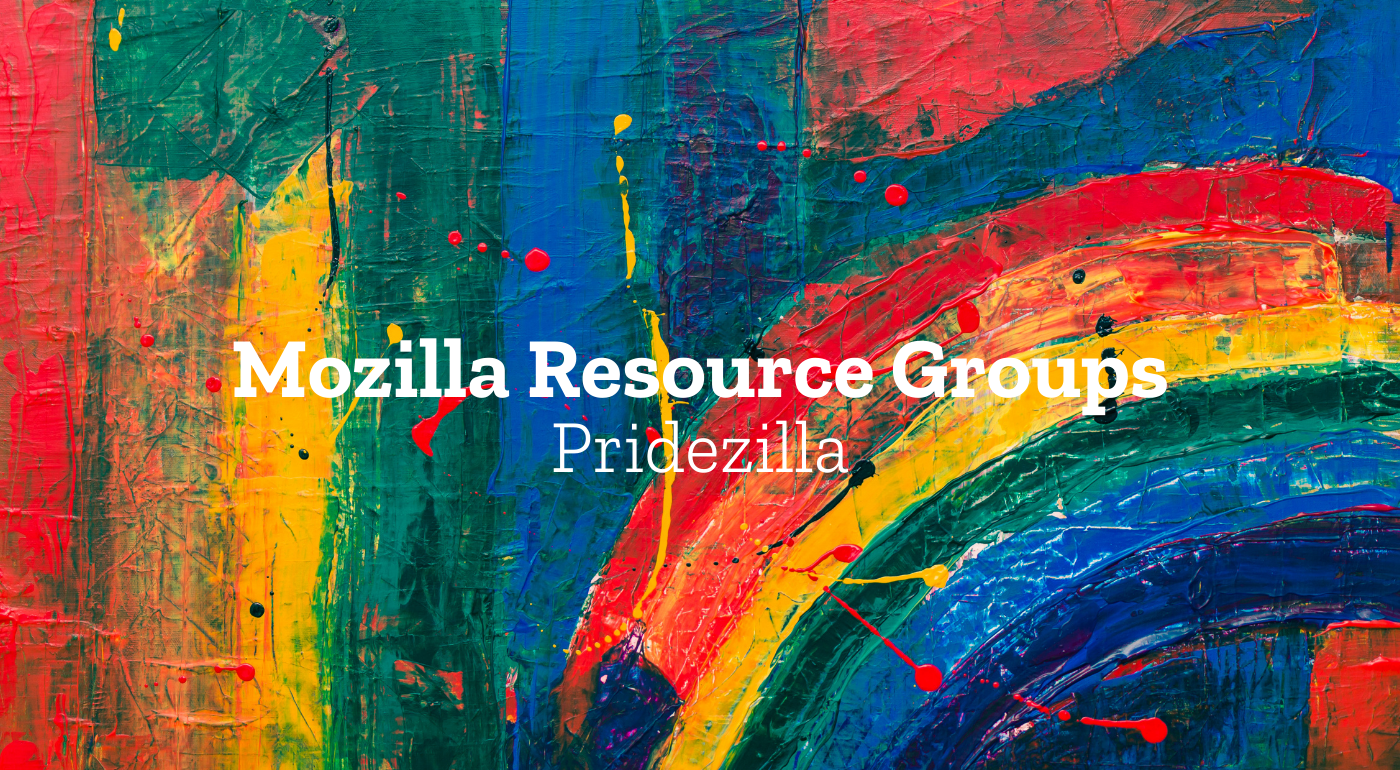It’s our mission at Mozilla to build an internet that includes everyone, regardless of demographics and backgrounds, and we’re building our team the same way. We believe our growing list of Mozilla Resource Groups (MRGs)—Afrozillians, Pridezilla, Latin Pride, Women of Mozilla, Mozilla API, and Disability@Mozilla—are critical to our success.
We also believe that the best way to understand these groups is through the people in them. Below, Mozilla Consumer Media Manager Damiano DeMonte shares some of the work Pridezilla is doing, how the rest of the company supports it, and his hopes for the future of the group.
How did you get involved with the Pridezilla MRG?
I joined our Pridezilla Slack channel when I first started—the People team promotes it during onboarding, and they’re great about adding and introducing anyone who wants to participate. It’s really just a place for us to organize, and to share our everyday lives. People have asked for tips on degendering their wardrobe; they’ve shared their experiences coming out to their coworkers and bosses. Recently, a member of the Pridezilla group shared an email from the Mozilla Foundation looking for people to work with an LGBTQ rights nonprofit in Fiji. They put out the word in the channel and connected those dots. We also talk about pop culture stuff, like Elvira coming out, or Lance Bass pushing for an LGBTQ season of The Bachelor.
Being part of the channel led to me getting involved in the MRG itself. I’d been part of the employee resource group at my previous job, and I knew it could be a good way to get to know people. Plus, planning for Pride Month was starting at the time, and I was excited about that. I wanted to use my creativity and help do something that would be beneficial, but also fun, for the whole team.
Tell us more about that—what was Pride Month like this year?
When we first started talking, the ideas were flowing. It was more than we could realistically do. So we wrote everything down and picked a few projects to put our resources and attention toward. We teamed up with Mozilla Hubs to create a VR room that had booths about different LGBTQ communities and a stage with a DJ where you could dance to music we curated. That was a lot of fun. We could only have 20 people at a time, and it was always maxed out.
We also worked with the Mozilla Foundation to do a special panel as part of their Dialogues and Debates speaker series. It was called Pride, the Internet, and the Pandemic, and it covered a bunch of issues relating to tech and the LGBTQ community—like algorithms flagging resources that are important and in some cases life-saving. We had a couple of virtual movie nights, too; we showed Pariah and This American Wife. And we did a Q&A with Jack Guinness, who created the website The Queer Bible. Jack also worked with Pocket on a special Joy List, which is basically a collection of things on the internet that can make someone happy.
We created some ways people could show support throughout the month, too, like special Zoom backgrounds of the different Pride flags, and Pride-themed Firefox emojis in Slack. And we created a resource list with some LGBTQ-focused books and also nonprofits you can volunteer with or donate to, like The Trevor Project, Sylvia Rivera Law Project, and GLAAD. One person Slacked me that they’d shared some of the resources we recommended with a family member and were able to open up a dialogue, which was amazing to hear.
How does the rest of the company support Pridezilla?
It really takes the whole team to pull off something like our Pride Month events, and that’s the great thing about working at Mozilla—if you have an idea that you want to bring to life, there’s probably someone here who can help. The VR experiences we created are a great example; it’s not that all of the Hubs team members are part of Pridezilla. Amber and Christian just got excited about it and wanted to partner with us.
We have support from our managers, too. I hadn’t been at Mozilla very long when I got involved with Pridezilla, but my boss, Ellen Canale, is so enthusiastic and has helped me make space for this. She’s super encouraging—the whole Marketing team is.
I think it all starts with our leadership. Leslie Gray, the Chief of Staff for our CEO, Mitchell Baker, is also our head of Diversity and Inclusion, and the things the MRG has accomplished so far are in part a testament to her ability to bring people together. And it’s not only Leslie—all of our leaders are invested in D&I and realize it’s important. In every All-Company meeting, Mitchell presents on where we are with products and finances, and then Leslie does a D&I update and brings people up to give more details on each month’s programming.
I had the chance to give that presentation after Pride Month. I was nervous being in front of the whole company like that—I thought I might black out! But everyone was so supportive, especially Steven Potter who took time out of his schedule to coach me through it; there were all these comments in the full-company Slack channel using the Pride emoji and saying how much they appreciated the update. It was a pretty incredible feeling!
What are you excited about in terms of the future of Pridezilla?
One way I’d love to see us grow is by finding opportunities to partner with nonprofits in this space that are doing such important work—like helping them get the word out about their research. We’re also thinking about how to approach programming throughout the year, not only during Pride. And of course intersectionality is key; we try to help amplify the work our other MRGs are doing, whether that’s communicating about programming for Juneteenth or sharing some reading about influential LGBTQ Latinx folks during Hispanic and Latin American Heritage Month.
I personally would also love to learn more about the experiences of LGBTQIA+ people in other countries, so I want to connect more with our Pridezilla members in places like Germany, London, and Canada.
Beyond that, I’m just excited for the group to grow. I’m so proud to work for a company that invests real resources in this kind of programming, and that understands a group like Pridezilla is important not only for Mozillians who are LGBTQ, but for all of us to better understand our colleagues from different walks of life. You don’t have to be a member of the community to participate; we’re a resource for anyone who wants to learn. The people working at this company come from so many different backgrounds and live all over the world, but we really are united. We’re all Mozillians.
